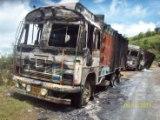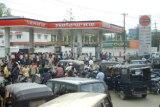Archives
Blockade in Manipur
T he price of petroleum products in the Northeastern state, reeling under a severe petrol and LPG crisis due to the highway blockade, has soared to `1500 per LPG cylinder not to speak of `100 per liter of petrol. An advertisement, published in the leading local newspapers of Imphal which promises an LPG or Photon (internet data card) free with every Sony Vaio laptop bought, only sums up the situation.
he price of petroleum products in the Northeastern state, reeling under a severe petrol and LPG crisis due to the highway blockade, has soared to `1500 per LPG cylinder not to speak of `100 per liter of petrol. An advertisement, published in the leading local newspapers of Imphal which promises an LPG or Photon (internet data card) free with every Sony Vaio laptop bought, only sums up the situation.
Manipur is facing its worst LPG crisis due to an economic blockade on the National Highways 39 (Dimapur-Kohima-Imphal) and 53 (Imphal-Jiribam-Silchar) the lifelines of the state since July 31st midnight by Sadar Hills Districthood Demand Committee (SHDDC) spearheaded by Kuki communities demanding the creation of the Sadar Hills district while the Naga group - United Naga Council (UNC) protested against the creation of this district within Naga inhabited areas. The UNC called a counter blockade on the above highways and National Highway 150 (Kohima-Ukhrul-Imphal) since August 21st.
COST OF ESSENTIAL COMMODITIES |
||
| Item | Post-Blockade | Pre-Blockade |
| a) LPG cylinder | Rs 1800 | Rs 415 |
| b) Petrol |
Rs 120 | Rs 65 |
| c) Diesel | Rs 60 | Rs 40 |
| d) Kerosene | Rs 50 | Rs 40 |
| e) Cooking oil |
Rs 105 |
Rs 13 |
| f) Onions |
Rs 60 |
Rs 20 |
| g) Potatoes | Rs 40 |
Rs 12 |
Due to the blockade, trucks have not been able to enter the state and petroleum products have become one of the most priced items not to speak of scarcity of essential items besides its impact on their prices. Nearly five lakh Imphalites are the major sufferers as the ongoing blockade is set to become the longest ever blockade, clocking more than two and a half months. The second longest economic blockade in Manipur called by Naga bodies last year lasted just 68 days.
“We are compelled to buy LPG at the rate of `1500 since last month,” says a housewife and mother of two children who lives in Singjamei area in Imphal West district said. “Otherwise we don’t have any alternative option.” Not only this young housewife, many other office goers and businessmen also share a similar sentiment. Restaurant owner T Rishikanta at Singjamei Super Market complex also in Imphal said, “We’re compelled to buy LPG at any cost otherwise how can we run the business? The time has come for the concerned parties to end the blockade to ease the hardship faced by the public.”
 The Bharatiya Janata Party (BJP) has accused both the Central and the Manipur Government of failing to prevent the rise in prices of essential commodities due to the economic blockade on the road links to Manipur. Urging the Centre to impose President’s Rule in Manipur by dismissing the ruling Secular Progressive Front ministry in the state till a fresh election is conducted, BJP’s national President Nitin Gadkari led party delegation on urged Prime Minister Dr. Manmohan Singh on October 21st to lead an all political party team to visit Manipur in connection with the prevailing situation in the state arising out of an economic blockade which has lasted almost 3 months in the state.
The Bharatiya Janata Party (BJP) has accused both the Central and the Manipur Government of failing to prevent the rise in prices of essential commodities due to the economic blockade on the road links to Manipur. Urging the Centre to impose President’s Rule in Manipur by dismissing the ruling Secular Progressive Front ministry in the state till a fresh election is conducted, BJP’s national President Nitin Gadkari led party delegation on urged Prime Minister Dr. Manmohan Singh on October 21st to lead an all political party team to visit Manipur in connection with the prevailing situation in the state arising out of an economic blockade which has lasted almost 3 months in the state.
The BJP team, in a memorandum to the Prime Minister said that LPG cylinders are sold at Rs 1800 per cylinder, petrol at Rs 120, diesel at Rs 60, Kerosene at Rs 50, cooking oil Rs 105 per liter. Onion, potato, arhar, moong dal and peas are sold at Rs 60, Rs 40, Rs 100, Rs 110 and Rs 50 respectively against the pre-blockade rates of Rs 415, Rs 65, Rs 40, Rs 13, Rs 75, Rs 20, Rs 12, Rs 70, Rs 80 and Rs 25 etc.
| The Longest Blockade in Manipur
Clocking more than 82 days on October 21st, the ongoing economic blockade in Manipur by Sadar Hills Districthood Demand Committee (SHDCC) is set to become the longest ever record breaking blockade imposed on road links to Manipur. The blockade began from July 31st midnight after SHDCC choked National Highway 39 and NH 53 – Manipur’s lifelines that meet at the state capital Imphal from two different directions after cutting through hills inhabited by various tribes – demanding creation of Sadar Hills district while the Naga group-United Naga Council(UNC), in protest against the creation of the district within Naga inhabited areas called a counter blockade on the above highways and NH 150 since August 21st. In 2005, the All Naga Students Association, Manipur carried out an economic blockade for 52 days beginning from June 19 against the decision of the state’s declaration of June 18th as ‘Integrity Day’. Then again in the year 2010, another economic blockade by Naga bodies broke the previous record by 16 days as it lasted for 68 complete days beginning from April 11th against the state government’s decision to prevent the entry of NSCN(IM) General Secretary Thuingaleng Muivah into the state. Interestingly, the ongoing SHDDC sponsored blockade and the UNC’s counter blockade entered 74 and 53 days respectively on October 13th without any hope of any negotiation between the two blockade initiators, nor any sign of action from the part of the government to solve the problem, the economic blockade is likely to continue forcing many to face the hardship in the state. The state’s Economics and Statistics Department sources estimated that the state has lost more than `250 crores due the ongoing blockade. “The state had witnessed 20 days of ‘bandh’ and 60 days of economic blockades in 2004-05 in which the state loss amounted to `246 crores with daily estimated loss of `5.34 crores for ‘bandh’ and `2.32 crores for economic blockade”, the source added. In 2005-06, the state witnessed 48 days of ‘bandh’ and 97 days of economic blockade which was the longest ever economic blockade in the history of Manipur. |
While BJP is busy meeting the Prime Minister on the situation in Manipur at New Delhi, the state’s ruling Secular Progressive Front (SPF) coalition partner Communist Party of India (CPI) also staged rallies at various parts of the state against price hike and criminalization. The party also submitted respective memoranda to the respective Deputy Commissioners of the state.
Most of the political parties including BJP, CPI and Manipur People’s Party also urged both the Central and State Governments to take a definite resolution on the demand of creation of the Sadar Hills district to end the blockade.
However all this has failed to move the striking parties. The SHDDC, rejecting the appeal of Union Home Minister P. Chidambaram to lift the blockade said that they will not go under the government’s pressure. While the SHDDC leaders vowed to continue their agitation, UNC in a media release also announced that it will intensify its economic blockade to register its protest and objection to the nefarious design “to legitimize the carving out of our traditional land for upgrading/creating new revenue districts.”
Manipur Chief Minister O Ibobi Singh, while addressing a surrender ceremony in Imphal on October 20th called upon ‘all groups and communities of Manipur’ to have a consensus on certain development issues. However he didn’t mention any specific development issue.
“I feel there must be some consensus among all groups and communities of Manipur on certain development issues,” said Ibobi while addressing a homecoming ceremony of 18 militants of seven different outfits at the Assam Rifles headquarter at Mantripukhuri on October 20th. “While all communities and groups may pursue their legitimate aspirations, there should not be any compromise on certain core developmental issues which touch the life of each and every individual.” He further said that the government has been consistently trying to improve the living standards of the people through various development programmes. However ethnic conflicts and unreasonable demands of various groups have been neutralizing the impact of the government interventions for development, he added. No government can succeed in bringing about change without the active support of the people. He also admitted that the continued economic blockade on the national highways has created scarcity of essential commodities in the state persisting for more than two months now. However, he did not elaborate on this.
Admitting that the state is passing through a difficult time, he said that the struggle based on ethnic identities coupled with the problem of economic development has posed serious constraints on this small but beautiful state.

